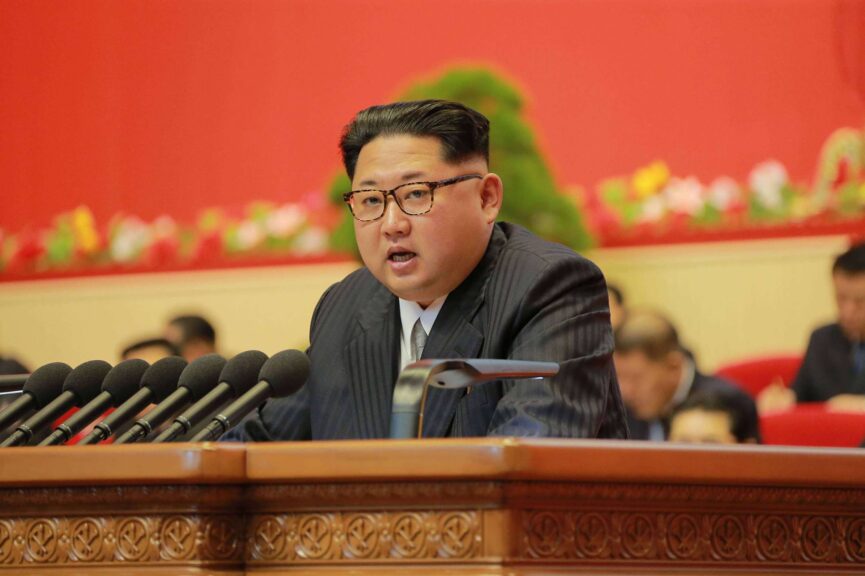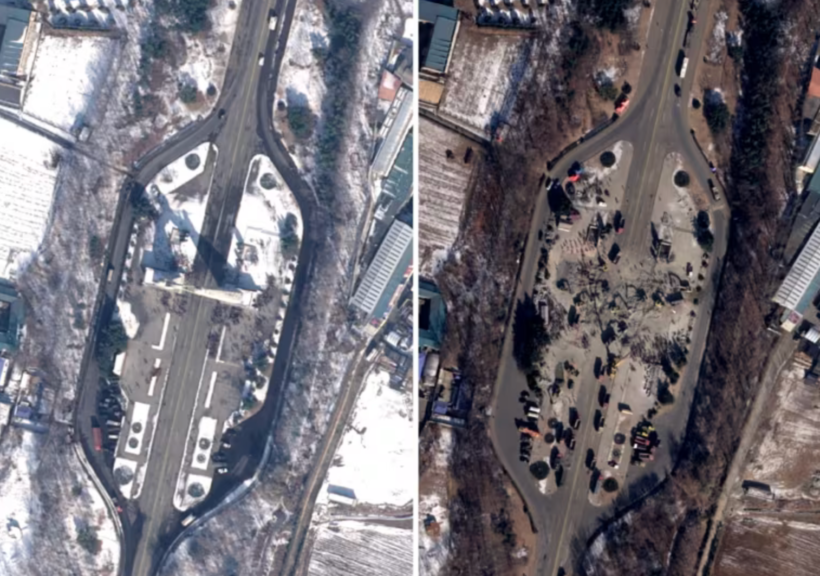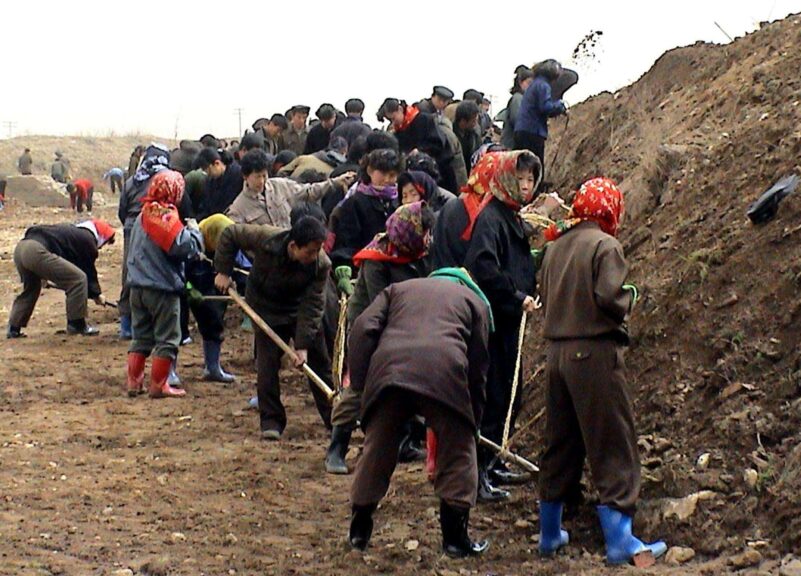Earlier this year, Kim Jong-un ordered the modification of the North Korean constitution, removing clauses related to peaceful reunification with the South. He has also declared South Korea the “most hostile country” and ordered the military to prepare for war.

On January 15, during the Tenth Session of the Fourteenth People’s Assembly of North Korea, Kim Jong-un proposed to dismantle the “Unification Gate” located in southern Pyongyang. Furthermore, he emphasized deleting phrases such as “autonomous, peaceful reunification, and national unity” from the constitution. At the same time, North Korea abolished relevant agencies that were tasked to improve inter-Korean relations and achieve a peaceful unification.
The Three Principles for National Reunification––autonomy, peaceful reunification, and national unity––were the dying wish of Kim Jong-un’s grandfather, Kim Il-sung. His father, Kim Jong-il, designated them as the “Three Great Charters” in November 1996. To demonstrate his determination to inherit the legacy of his father, Kim Jong-il ordered the construction of a 30-meter-high monument symbolizing the “Three Great Charters of National Reunification” at the entrance of the “Unification Road” leading to southern Pyongyang in 2000.

This monument, representing the legacy of his father and grandfather, has now been dismantled by Kim Jong-un. According to NK News, a satellite image has revealed that the “unification monument” was demolished in mid-January.
Kim’s actions are seen by some analysts as an attempt to unload a political burden passed down to him that became unbearable. The differences between the two Koreas extend far beyond political systems and social structures, and the economic disparity is vast.
In the 1970s, the per capita GDP of North and South Korea were similar, but by the early 1990s, the gap had become significant. Currently, North Korea’s per capita GDP is less than $300, while South Korea’s is close to $40,000. South Korea’s 50 million population is double that of North Korea’s, and its GDP is over 260 times greater.
For Kim Jong-un, reunification is an unrealistic goal and a burden. Achieving reunification would require strengthening exchanges with the South, which could lead to escalating pressure and calls for reforms in the North. Recently, two North Korean teenagers were severely punished with prison sentences of over a decade for clandestinely watching South Korean TV dramas. Kim seems to be fearful of the consequences of North Koreans becoming aware of the freedom and prosperity in South Korea. To block this kind of influence, Kim Jong-un felt compelled to cut off all exchanges and connections with the South.
The North Korean economy has become even more dire in recent months. North Korea has long suffered from food shortages. The situation worsened during the pandemic. At the beginning of the new year, the food prices in North Korea skyrocketed. As of January, in Hyesan City, Ryanggang Province, the price of 1 kg of rice was 5,400 North Korean won (about $6), a 5.9% increase from two weeks prior. The average monthly salary in North Korea is 195,000 won, which is the equivalent of 36 kg of rice.

In January, during the 19th Politburo meeting, Kim Jong-un uncharacteristically admitted to the failure of North Korea’s state rationing system. He acknowledged the country’s severe economic situation, saying that most areas of North Korea were facing a “dire situation” and that “the inability to provide basic food and necessities to rural areas is a serious political problem that the party and government cannot ignore.”
Many believe that Kim Jong-un’s series of abnormal actions are aimed at preventing internal dissent. Cutting ties with South Korea also provides North Korea an opportunity to divert attention and assert itself amid the ongoing Russia-Ukraine war, and conflicts in the Middle East, South China Sea, East China Sea, and Taiwan Strait. According to Chinese overseas political commentator Yuan Hongbing, Kim Jong-un believes that the dynamic of a new Cold War between China and the United States can benefit his regime.
Yuan Hongbing: “To understand the current relationship between China and North Korea, including the tense relations between North and South Korea, one must view it from a broader geopolitical perspective, which is that Xi Jinping wants to take a crucial step toward global communist expansion by launching a war in the Taiwan Strait.
Recently, North Korea changed its attitude toward South Korea and the change was dramatic. This is because North Korea has effectively incorporated itself into the strategic framework of the CCP’s decisive war in the Taiwan Strait.” 17:01] [24:37 Once an all-out war between China and the United States erupts in the Taiwan Strait, North Korea’s main function will be 1] to deter American forces in South Korea, 2) to deter Japanese military forces, and 3) to deter U.S. military bases in Japan, thereby providing leverage for the CCP’s war to conquer Taiwan. This is the role that North Korea may play now.”
South Korea has always been supported by the United States, while North Korea was originally backed by the Soviet Union and China. After the collapse of the Soviet Union, and with Russia and China establishing diplomatic relations with South Korea, North Korea felt isolated. The United States has no diplomatic relations with North Korea, and before Trump took office, leaders of both countries had never met. China seized the opportunity to help North Korea develop nuclear weapons and intercontinental missiles.
Guo Jun, “Initially, Xi Jinping wasn’t fond of the Kim regime in North Korea. In the first 5 years of Xi’s tenure since 2013, he never visited North Korea or met with members of the Kim family. It was not until May 2018 that Xi met with Kim. By that time, the 19th Party Congress had concluded and Xi’s re-election was secured because the timetable for Taiwan unification had been set.
The United States reacted strongly, promptly passing the Taiwan Travel Act, directly confronting Beijing. Xi met with Kim then to regain the leverage against the United States. The CCP wants to make sure North Korea acts as a buffer, an anti-American vanguard, and a bargaining chip in negotiating with the U.S.
Currently, Northeast Asia is divided into two camps. The United States, Japan and South Korea are in one camp, while China, Russia and North Korea are in the other. The United States aims at China, and not North Korea, through its US-Japan-South Korea military alliance.
The distance between the U.S. airbases in South Korea is approximately 960 km away from Beijing. It takes American F16 and F15 fighter jets about 40 minutes to reach, and 20 minutes for F22 or F35 jets to reach Beijing. That’s why the area around Wafangdian in Dalian is home to China’s best anti-aircraft units, equipped with the best radars to counter the Americans.
According to recommendations from the RAND Corporation, if China were to attack Taiwan, the U.S. military could launch sudden strikes on the industrial centers in northern China, utilizing aircraft based in South Korea and Japan. The presence of the U.S. military in South Korea, therefore, poses a big threat to China, and China has always reacted strongly to this issue.
On January 6, North Korea fired more than 60 artillery shells into the maritime buffer zone in the western waters of the peninsula, conducting consecutive days of shelling. On January 14, North Korea launched medium-range ballistic missiles into the Sea of Japan.
Former CIA analyst Robert Carlin and nuclear scientist Siegfried Hecker wrote on the website “38North” in January and said that Kim Jong-un has made the strategic decision to start a war. However, many experts hold a contrary view, believing that North Korea’s actions are not necessarily indicative of a desire to start a war.
Former director of the Korea Institute for National Unification, Taewoo Kim, said one of Kim Jong-un’s goals is “to disrupt the South Korean parliamentary elections, divide South Korea, and create conflicts.” The upcoming South Korean parliamentary elections in April are crucial. Currently, the competition for parliamentary seats between South Korea’s two major parties is heating up. If the ruling Democratic Party loses to the People Power Party in the April elections, President Yoon who takes a tough stance toward the North still has 3 years left in his term, will find it difficult to shape South Korea’s policies.
Professor Kim said that whenever North Korea increases its threat against the South, the left and right wings in South Korea become more divided and contentious. Therefore, one of the best ways to deal with Kim Jong-un’s provocations is for South Korea to unite internally.
Watch Lei’s full video here:






